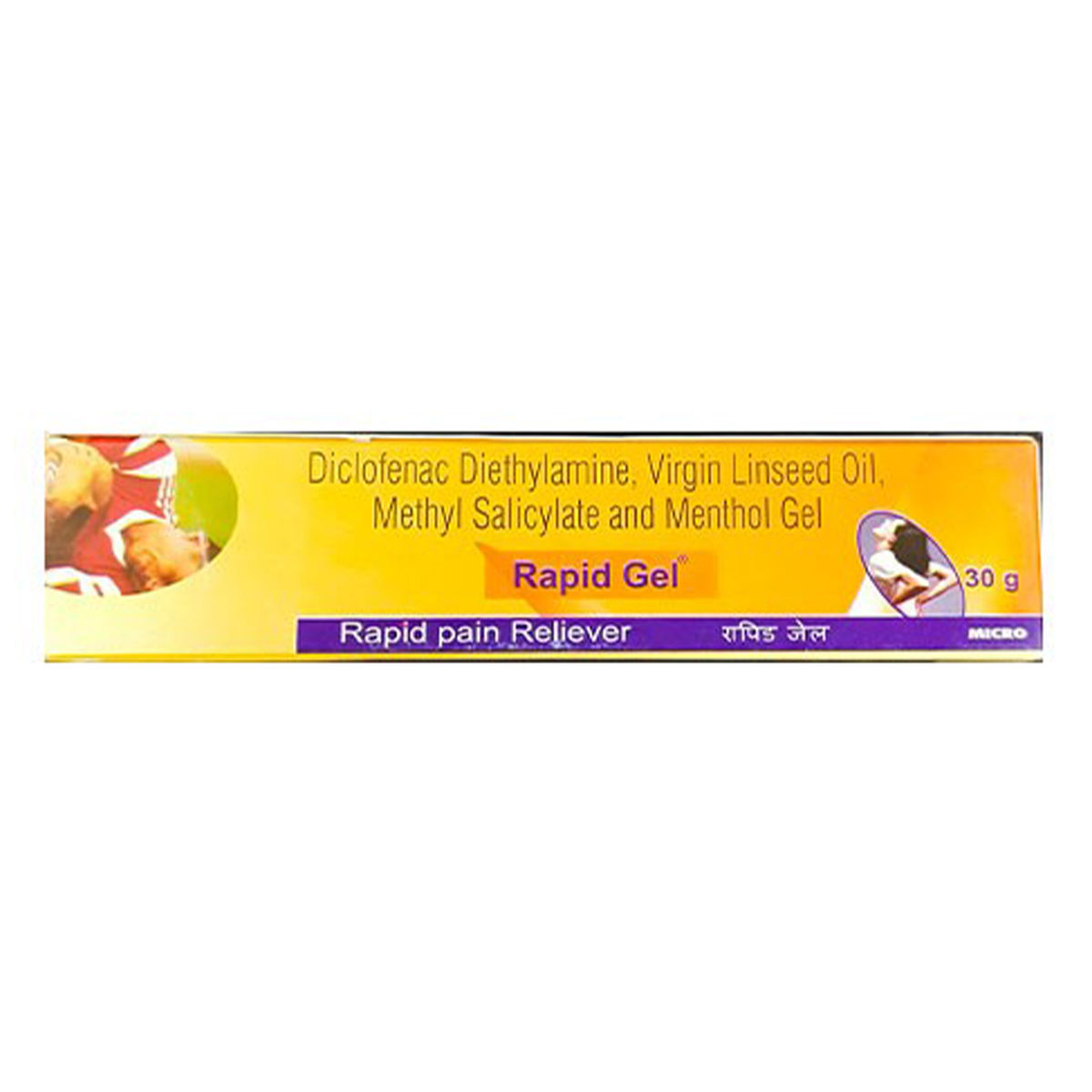Dicomet Gel 30 gm
₹171*
MRP ₹190
10% off
₹161.5*
MRP ₹190
15% CB
₹28.5 cashback(15%)
Free Delivery
With Circle membership
(Inclusive of all Taxes)
This offer price is valid on orders above ₹800. Apply coupon PHARMA10/PHARMA18 (excluding restricted items)
Know Your Delivery Time
Provide Delivery Location

Available Offers

Secure Payment

India's Most Trusted Pharmacy

Genuine Products
తయారీదారు/మార్కెటర్ :
వినియోగ రకం :
రిటర్న్ పాలసీ :
వీటి తర్వాత లేదా వీటిపై గడువు ముగుస్తుంది :
Dicomet Gel 30 gm గురించి
Dicomet Gel 30 gm తీవ్రమైన కండరాల మరియు అస్థిపంజర నొప్పి మరియు కీళ్ల కీళ్లనొప్పుల నొప్పి నుండి ఉపశమనం పొందడానికి ఉపయోగించబడుతుంది. ఇది నొప్పి, వాపు మరియు కీళ్ల దృఢత్వాన్ని తగ్గిస్తుంది, తద్వారా కీలును కదిలించే మరియు వంచే మీ సామర్థ్యాన్ని మెరుగుపరుస్తుంది.
Dicomet Gel 30 gm లో డిక్లోఫెనాక్ మరియు మిథైల్ సాలిసిలేట్ (నొప్పి నివారిణిగా), లిన్సీడ్ ఆయిల్ (నొప్పి నివారిణిగా) మరియు మెంథాల్ (శీతల కారకంగా) ఉంటాయి. Dicomet Gel 30 gm మొదట skóraను చల్లబరుస్తుంది, తరువాత వేడి చేస్తుంది, ఇది నరాల ద్వారా నొప్పి సంకేత ప్రసారానికి ఆటంకం కలిగిస్తుంది. Dicomet Gel 30 gm నొప్పి మరియు వాపుకు కారణమయ్యే రసాయన దూతల విడుదలను అడ్డుకుంటుంది, ఎరుపు మరియు వాపుతో కలిసి పనిచేస్తుంది.
Dicomet Gel 30 gm ను మీ వైద్యుడు సలహా ఇస్తేనే ఉపయోగించాలి. Dicomet Gel 30 gm ను చర్మానికి మాత్రమే ఉపయోగించాలి మరియు అనుకోకుండా అది మీ కంటిలో, నోటిలో లేదా ముక్కులోకి వెళితే, నీటితో శుభ్రం చేసుకోండి. Dicomet Gel 30 gm ను శుభ్రమైన దూది లేదా గాజుగుడ్డ స్వాబ్తో ప్రభావిత ప్రాంతానికి అప్లై చేయాలి. అసహ్యకరమైన దుష్ప్రభావాలను నివారించడానికి Dicomet Gel 30 gm ను సిఫారసు చేసిన మోతాదు కంటే ఎక్కువగా అప్లై చేయకూడదు. Dicomet Gel 30 gm యొక్క కొన్ని సాధారణ దుష్ప్రభావాలు Dicomet Gel 30 gm అప్లై చేసిన చోట చర్మంపై మంట, దురద, ఎరుపు, మంట మరియు పొడిబారడం. ఈ దుష్ప్రభావాలు సాధారణంగా తేలికపాటివి మరియు స్వల్పకాలికమైనవి. అయితే, దుష్ప్రభావాలు కొనసాగితే, మీ వైద్యుడిని సంప్రదించండి.
Dicomet Gel 30 gm రెండు సంవత్సరాల కంటే తక్కువ వయస్సు ఉన్న పిల్లలకు వ్యతిరేకం. దీనితో పాటు, పెద్ద పిల్లలకు (2-12 సంవత్సరాలు) చికిత్స చేసేటప్పుడు జాగ్రత్త వహించాలి. వైరల్ ఫ్లూ, చికెన్ పాక్స్ లేదా వైరల్ జ్వరంతో బాధపడుతున్న పిల్లలు Dicomet Gel 30 gm ను ఉపయోగించడం మానుకోవాలి ఎందుకంటే ఇందులో మిథైల్ సాలిసిలేట్ ఉంటుంది, ఇది రేస్ సిండ్రోమ్ (లివర్ మరియు మెదడులో వాపు) కు కారణం కావచ్చు.
Dicomet Gel 30 gm ఉపయోగాలు
ఉపయోగించుటకు దిశలు
ఔషధ ప్రయోజనాలు
Dicomet Gel 30 gm లో డిక్లోఫెనాక్ మరియు మిథైల్ సాలిసిలేట్ (నొప్పి నివారిణిగా), లిన్సీడ్ ఆయిల్ (నొప్పి నివారిణిగా) మరియు మెంథాల్ (శీతల కారకంగా) ఉంటాయి. Dicomet Gel 30 gm మొదట చర్మం చల్లబరుస్తుంది, తరువాత వేడి చేస్తుంది, ఇది నరాల ద్వారా నొప్పి సంకేత ప్రసారానికి ఆటంకం కలిగిస్తుంది. Dicomet Gel 30 gm నొప్పి మరియు వాపుకు కారణమయ్యే రసాయన దూతల విడుదలను అడ్డుకుంటుంది, ఎరుపు మరియు వాపుతో కలిసి పనిచేస్తుంది.
నిల్వ
Dicomet Gel 30 gm యొక్క దుష్ప్రభావాలు
- చర్మపు చికాకు
- కాంటాక్ట్ డెర్మటైటిస్
- రాష్
- దురద
- ఎరుపు
- వాపు
- మంట లేదా కుట్టడం లాంటి అనుభూతి
మందు హెచ్చరికలు
Dicomet Gel 30 gm వాడే ముందు, మీకు Dicomet Gel 30 gm ఇతర నొప్పి నివారిణులకు (ఇబుప్రోఫెన్, నాప్రోక్సెన్, సెలెకోక్సిబ్ వంటివి) అలెర్జీ ఉంటే లేదా మీకు ఏవైనా ఇతర అలెర్జీలు ఉంటే మీ వైద్యుడికి చెప్పండి. ఉబ్బసం, లివర్ వ్యాధి, మూత్రపిండ వ్యాధి, కడుపు/పేగు సమస్యలు (రక్తస్రావం, పూత, క్రోన్స్ వ్యాధి), హృదయ సంబంధ వ్యాధులు (గుండెపోటు, అధిక రక్తపోటు, స్ట్రోక్), వాపు (ఎడెమా, ద్రవ నిలుపుదల), రక్త రుగ్మతలు (రక్తహీనత వంటివి), రక్తస్రావం/గడ్డకట్టే సమస్యలు ఉన్నవారికి Dicomet Gel 30 gm వాడకం వ్యతిరేకం. 2 సంవత్సరాల కంటే తక్కువ వయస్సు ఉన్న పిల్లలకు Dicomet Gel 30 gm ఇవ్వకూడదు. వృద్ధులలో Dicomet Gel 30 gm వాడకంలో జాగ్రత్త వహించాలి ఎందుకంటే వారికి మూత్రపిండాల దెగ్గతి మరియు జీర్ణాశయ రక్తస్రావం అయ్యే ప్రమాదం ఎక్కువగా ఉంటుంది.
Drug-Drug Interactions
Drug-Drug Interactions
Login/Sign Up
Drug-Food Interactions
Drug-Food Interactions
Login/Sign Up
అలవాటు చేసేది
Dicomet Gel Substitute

Etolgia-TH Gel 30 gm
₹7.61per tabletFrizpain Nano Gel 30 gm
by AYUR
₹4.20per tabletRapid Gel 30 gm
₹3.68per tabletDan Gel 75 gm
₹1.57per tabletDofaq 30Gm Gel
by AYUR
₹4.05per tablet
Product Substitutes
ఆల్కహాల్
జాగ్రత్త
మందులు వాడుతున్నప్పుడు ఆల్కహాల్ తీసుకోకపోవడమే మంచిది ఎందుకంటే దీనిని Dicomet Gel 30 gm తో కలిపి వాడితే జీర్ణాశయంలో రక్తస్రావం అయ్యే అవకాశం పెరుగుతుంది.
గర్భం
సూచించినట్లయితే సురక్షితం
దీన్ని వాడే ముందు వైద్యుడిని సంప్రదించడం మంచిది.
క్షీరదీయడం
సూచించినట్లయితే సురక్షితం
క్షీరదీయడంలో Dicomet Gel 30 gm వాడకం సురక్షితమో కాదో తెలియదు, కాబట్టి తల్లికి మరియు బిడ్డకు కలిగే ప్రమాదాలతో పోల్చి దాని ప్రయోజనాన్ని అంచనా వేయాలి.
డ్రైవింగ్
సూచించినట్లయితే సురక్షితం
Dicomet Gel 30 gm డ్రైవ్ చేసే సామర్థ్యంపై లేదా యంత్రాలను ఉపయోగించే సామర్థ్యంపై ఏ ప్రభావం చూపదు లేదా చాలా తక్కువ ప్రభావం చూపుతుంది.
లివర్
సూచించినట్లయితే సురక్షితం
Dicomet Gel 30 gm కి ఏవీ నిర్దిష్ట పరస్పర చర్యలు లేవు. అయితే, తీవ్రమైన లివర్ వ్యాధులలో, అతి తక్కువ ప్రభావవంతమైన మోతాదును అతి తక్కువ వ్యవధిలో వాడాలి.
కిడ్నీ
జాగ్రత్త
అధునాతన మూత్రపిండ వ్యాధి ఉన్న రోగులలో Dicomet Gel 30 gm యొక్క ప్రభావం మరియు భద్రత గురించి ఎలాంటి సమాచారం అందుబాటులో లేదు. అందువల్ల, అధునాతన మూత్రపిండ వ్యాధి ఉన్న రోగులకు Dicomet Gel 30 gm తో చికిత్స చేయమని సిఫారసు చేయబడలేదు. ఈ సందర్భంలో Dicomet Gel 30 gm ఉపయోగించినట్లయితే, రోగి యొక్క మూత్రపిండ పనితీరును నిశితంగా పర్యవేక్షించడం మంచిది.
పిల్లలు
జాగ్రత్త
2 సంవత్సరాల కంటే తక్కువ వయస్సు ఉన్న శిశువులకు Dicomet Gel 30 gm వ్యతిరేకం. Dicomet Gel 30 gm వాడే ముందు సలహా కోసం మీ వైద్యుడిని సంప్రదించండి.
FAQs
మూలం దేశం
తయారీదారు/మార్కెటర్ చిరునామా
Disclaimer
Author Details
We provide you with authentic, trustworthy and relevant information
























